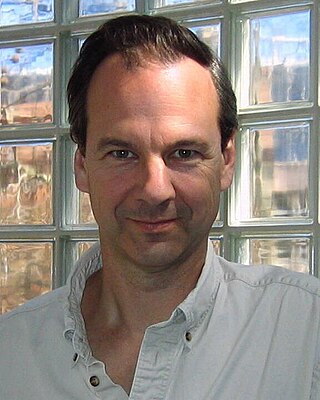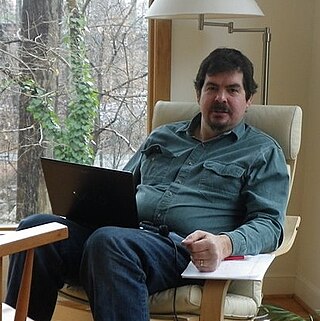Related Research Articles

Legacy preference or legacy admission is a preference given by an institution or organization to certain applicants on the basis of their familial relationship to alumni of that institution. It is most controversial in college admissions, where students so admitted are referred to as legacies or legacy students. The practice is particularly widespread in the college admissions in the United States; almost three-quarters of research universities and nearly all liberal arts colleges grant legacy preferences in admissions.

Lars Peter Hansen is an American economist. He is the David Rockefeller Distinguished Service Professor in Economics, Statistics, and the Booth School of Business, at the University of Chicago and a 2013 recipient of the Nobel Memorial Prize in Economics.
Structural estimation is a technique for estimating deep "structural" parameters of theoretical economic models. The term is inherited from the simultaneous equations model. Structural estimation is extensively using the equations from the economics theory, and in this sense is contrasted with "reduced form estimation" and other nonstructural estimations that study the statistical relationships between the observed variables while utilizing the economics theory very lightly. The idea of combining statistical and economic models dates to mid-20th century and work of the Cowles Commission.
Charles Frederick Manski is an American economist and university professor at the Northwestern University. Manski is a noted econometrician, known for his work in rational choice theory and an innovator in the area of parameter identification. His research spans econometrics, judgment and decision, and the analysis of social policy. A specialist in prediction and decision, he is known within the economics field for landmark work on partial identification, identification of discrete choice models, and identification of social interactions. He has also performed substantial empirical research on measurement of expectations in surveys.
Kenneth E. Train is an Adjunct Professor of Economics at the University of California, Berkeley, United States. He is also Vice President of NERA Economic Consulting, Inc. in San Francisco, California. He received a Bachelors in Economics at Harvard and PhD from UC Berkeley. He specializes in econometrics and regulation, with applications in energy, environmental studies, telecommunications and transportation.
Pietro Balestra was a Swiss economist specializing in econometrics. He was born in Lugano and earned a B.A. in economics from the University of Fribourg. Balestra moved for graduate work to the University of Kansas and Stanford University. He was awarded the Ph.D. in Economics by Stanford University in 1965.
The methodology of econometrics is the study of the range of differing approaches to undertaking econometric analysis.

LIMDEP is an econometric and statistical software package with a variety of estimation tools. In addition to the core econometric tools for analysis of cross sections and time series, LIMDEP supports methods for panel data analysis, frontier and efficiency estimation and discrete choice modeling. The package also provides a programming language to allow the user to specify, estimate and analyze models that are not contained in the built in menus of model forms.

Michael Patrick Keane is an American-born economist; he is the Wm. Polk Carey Distinguished Professor at Johns Hopkins University. Keane was previously a professor at the University of New South Wales and the Nuffield Professor of Economics at the University of Oxford. He is considered one of the world's leading experts in the fields of Choice Modelling, structural modelling, simulation estimation, and panel data econometrics.

John Philip Rust is an American economist and econometrician. John Rust received his PhD from MIT in 1983 and taught at the University of Wisconsin, Yale University and University of Maryland before joining Georgetown University in 2012. John Rust was awarded Frisch Medal in 1992 and became the fellow of Econometric Society in 1993.
Students for Fair Admissions v. Harvard, 600 U.S. 181 (2023), is a landmark decision of the Supreme Court of the United States in which the court held that race-based affirmative action programs in college admissions processes violate the Equal Protection Clause of the Fourteenth Amendment. With its companion case, Students for Fair Admissions v. University of North Carolina, the Supreme Court effectively overruled Grutter v. Bollinger (2003) and Regents of the University of California v. Bakke (1978), which validated some affirmative action in college admissions provided that race had a limited role in decisions.
Richard Henry Sander is an American legal scholar. He is the Jesse Dukeminier Professor in Law at the University of California, Los Angeles School of Law and a critic of affirmative action. Sander is primarily known for producing the mismatch theory.
Peter Schmidt is an American economist and econometrician. He holds a University Distinguished Professor position at Michigan State University in East Lansing, Michigan. Schmidt is considered a foundational scholar in econometrics, having authored an early textbook in the field as well as over 150 peer-reviewed articles. In addition, Schmidt has been recognized for his excellence in teaching, with one economist stating that "a top twenty economics department could be started up from" the students he has mentored.
Anna Mikusheva is the Professor of Economics at Massachusetts Institute of Technology. She was the 2012 recipient of the Elaine Bennett Research Prize, a bi-annual prize that recognizes and celebrates research by a woman in the field of Economics, and was selected as a Sloan Research Fellow in 2013. She is a co-editor of the journal Econometric Theory.

Robin C. Sickles is an American economist.
Petra Elisabeth (Crockett) Todd is an American economist whose research interests include labor economics, development economics, microeconomics, and econometrics. She is the Edward J. and Louise W. Kahn Term Professor of Economics at the University of Pennsylvania, and is also affiliated with the University of Pennsylvania Population Studies Center, the Human Capital and Equal Opportunity Global Working Group (HCEO), the IZA Institute of Labor Economics and the National Bureau of Economic Research.

Subal C. Kumbhakar is an Indian born American economist. He is a Distinguished Research Professor of Economics at Binghamton University. He was awarded Doctor Honoris Causa, 1997, Gothenburg University, Sweden. He is a fellow of Journal of Econometrics, distinguished author of Journal of Applied Econometrics, co-editor of the Social Science Citation Index journal Empirical Economics, coauthor of a highly cited book on Stochastic Frontier Analysis. He is associated with the University of Stavanger, Norway and Inland School of Business and Social Sciences, Lillehammer, Norway. He advises Oxera Consulting LLP Oxford, UK on regulatory performance measures. He is internationally known for his research on efficiency and productivity. His models on efficiency and productivity are used by researchers worldwide.
Siddhartha Chib is an econometrician and statistician, the Harry C. Hartkopf Professor of Econometrics and Statistics at Washington University in St. Louis. His work is primarily in Bayesian statistics, econometrics, and Markov chain Monte Carlo methods.
Stéphane Bonhomme is a French economist currently at the University of Chicago, where he is the Ann L. and Lawrence B. Buttenwieser Professor of Economics. Bonhomme specializes in microeconometrics. His research involves latent variable modeling, modeling of unobserved heterogeneity in panel data, and its applications in labor economics, in particular the analysis of earnings inequality and dynamics.

Yingyao Hu 胡颖尧 is a Chinese American economist, the Krieger-Eisenhower professor of economics, and currently Vice Dean for Social Sciences, Krieger School of Arts & Sciences, Johns Hopkins University.
References
- ↑ "Fellows of the Econometric Society" . Retrieved July 23, 2019.
- 1 2 Arcidiacono, Peter; Lovenheim, Michael (2016). "Affirmative Action and the Quality-Fit Trade-Off". Journal of Economic Literature. 54 (1): 3–51. doi:10.1257/jel.54.1.3. S2CID 1876963.
- ↑ Arcidiacono, Peter; Ellickson, Paul B. (2011). "Practical Methods for Estimation of Dynamic Discrete Choice Models". Annual Review of Economics. 3 (1): 363–394. doi:10.1146/annurev-economics-111809-125038. S2CID 17631350.
- ↑ Altonji, Joseph G.; Arcidiacono, Peter; Maurel, Arnaud (2016). Handbook of the Economics of Education. Vol. 5. Elsevier. pp. 305–396. ISBN 9780444634597.
- ↑ "Online research papers by Peter Arcidiacono" . Retrieved July 24, 2019.
- ↑ "Curriculum vitae" (PDF).
- ↑ Arcidiacono, Peter; Aucejo, Esteban M.; Fang, Hanming; Spenner, Kenneth I. (2011). "Does affirmative action lead to mismatch? A new test and evidence" (PDF). Quantitative Economics. 2 (3): 303–333. doi: 10.3982/QE83 .
- ↑ Arcidiacono, Peter; Aucejo, Esteban M.; Spenner, Ken (2012). "What happens after enrollment? An analysis of the time path of racial differences in GPA and major choice". IZA Journal of Labor Economics. 1 (5): 5. doi: 10.1186/2193-8997-1-5 . hdl: 10.1186/2193-8997-1-5 .
- ↑ "Citations of Arcidiacono and Jones (2003)" . Retrieved July 24, 2019.
- ↑ "Citations of Arcidiacono and Miller (2011)" . Retrieved July 24, 2019.
- ↑ "Citations of Arcidiacono and Jones (2003)" . Retrieved July 24, 2019.
- ↑ "Citations of Arcidiacono and Miller (2011)" . Retrieved July 24, 2019.
- ↑ Arcidiacono, Peter (2004). "Ability sorting and the returns to college major". Journal of Econometrics. 121 (1–2): 343–375. CiteSeerX 10.1.1.495.4139 . doi:10.1016/j.jeconom.2003.10.010.
- ↑ Arcidiacono, Peter; Hotz, V. Joseph; Kang, Songman (2012). "Modeling college major choices using elicited measures of expectations and counterfactuals". Journal of Econometrics. 166 (1): 3–16. CiteSeerX 10.1.1.173.4420 . doi:10.1016/j.jeconom.2011.06.002.
- ↑ Arcidiacono, Peter; Aucejo, Esteban M; Spenner, Ken (2012). "What happens after enrollment? An analysis of the time path of racial differences in GPA and major choice". IZA Journal of Labor Economics. 1 (1). Walter de Gruyter GmbH: 5. doi: 10.1186/2193-8997-1-5 . hdl: 10.1186/2193-8997-1-5 . ISSN 2193-8997.
- ↑ "Not Catching Up: Affirmative Action at Duke University". Marginal Revolution. January 17, 2012.
- ↑ "Racial controversy at Duke challenges affirmative action". The College Fix. February 13, 2012.
- ↑ "Curriculum vitae" (PDF).
- ↑ "Question at center of Harvard trial: What counts as discrimination?". Boston Globe. October 21, 2018.
- ↑ "Dueling Economists: Rival Analyses of Harvard's Admissions Process Emerge at Trial". Chronicle of Higher Education. October 30, 2018.
- ↑ "Admissions Case: Supporting Documents" . Retrieved July 25, 2019.
- ↑ "SFFA Files Motion for Summary Judgment Against UNC" . Retrieved July 25, 2019.
- ↑ "That Other Affirmative-Action Case: The Battle Over UNC's Admissions Policies Heats Up". Chronicle of Higher Education. January 18, 2019.
- ↑ "Students for Fair Admissions, Inc. v. President and Fellows of Harvard College et al" . Retrieved July 26, 2019.
June 15, 2018 ... Filing 421
- 1 2 3 "Amicus Brief filed by Amici Curiae Economists Michael Keane et al., in Support of Students for Fair Admissions" . Retrieved July 26, 2019.
- 1 2 "Amicus Brief filed by Amici Curiae Economists Susan Dynarski et al., in Support of Harvard" (PDF). Retrieved July 26, 2019.
- ↑ "Amended Amicus Brief filed by Amici Curiae Economists Susan Dynarski et al., in Support of Harvard" (PDF). Archived from the original (PDF) on October 22, 2018. Retrieved July 26, 2019.
- ↑ "Catholic Links".[ failed verification ]
- ↑ Pete Hynes (March 8, 2017). "#15: Being A Christian Witness In Academia". The Two or Three Podcast (Podcast). Retrieved July 25, 2019.